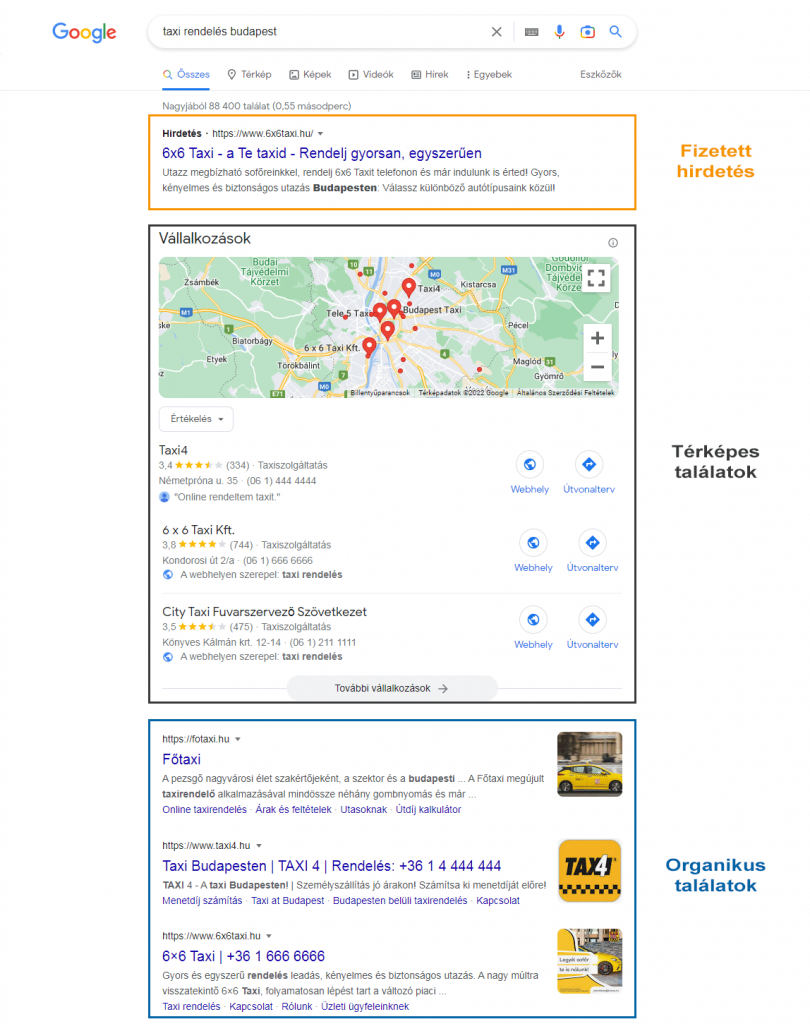Google ranking check in practice - Weboptim
I have put together a brief overview of how Google positioning queries work and why they are so important in search engine optimization projects. To understand this, we need to talk a bit about search engine optimization itself.
For businesses, search engine optimisation itself is about getting their website to rank better on Google for the most important keywords. I think the importance of this does not need much explanation. The higher you rank for the more important keywords in the search results, the more traffic you will get and therefore the more revenue your website will generate.
Over the past 20 years, we have worked with a wide variety of companies. Some of them are already doing this kind of work on a professional level, i.e. checking their keyword positions and actively optimising their websites. But there are also others, who have not even got as far as assessing how they currently rank in Google's search results. This document can help thosewho belong to the latter group.
In any case, the first step is to find out what positions we occupy, but if we take a step back and look at the problem more closely, we can see that this implies that we have to do more work. For example, choosing the right and careful keywords.

How to choose the right keywords?
At first glance, it may seem like a simple task, but if you think about it, it's far from trivial. In any case, this is the first and fundamental step of querying positions and examining placements.
But the process of search engine optimisation - also known as SEO - is not necessarily just about increasing traffic. Some companies need to be at the top of Google's listings for several keywords, either for "professional" or prestige reasons.
Hence, we are also contacted with problems that a company does not appear at the top of the organic listings for their own brand name. Remedying the latter can also be the goal of an SEO project.
Querying Google positions
Querying positions may seem like an easy task at first, as you can also manually type in your keywords and note their position in the list. However, this is a manual task, and when you are working with hundreds of keywords it can be quite tedious.
In addition, we will very soon find that Google will block further searches for us and we will have to prove that we are not robots. For these reasons, it is better to use software to retrieve rankings.
CaptCha codes
This technology was developed so that software could make sure that we were not launching a series of automated queries to Google. These Captha puzzles are difficult for software to solve, so presumably there is a human behind the computer who can do the job.
A professional Google position retrieval software can decipher these codes and still retrieve our rankings for hundreds or even thousands of keywords.
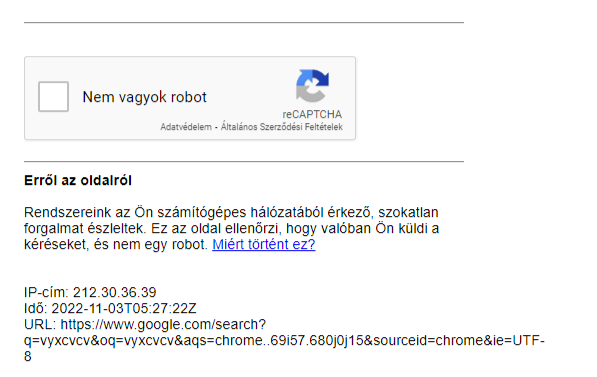
Frequency of consultation
It is not really worth looking at our positions on a daily basis, because they do not change that quickly. In our experience, it is sufficient to check the current keyword positions once or twice a month. I should note here that most website owners do not monitor them at all.
Selecting keywords for your query
When choosing keywords, a common question for a business is how many keywords to choose, either for query or as an important keyword to use in a search engine optimisation project.
The answer we always give is that it is not necessarily the number of keywords that is important, but that these keywords are relevant to the business in question.
Here I would like to go into a little more detail about how keywords are classified. Keywords can be classified according to relevance, i.e. how well they cover what your business does. In addition, keywords can be classified according to their search volume, i.e. how many times users search for that word in a month. The third aspect to consider is how difficult it is to improve the position of a keyword, i.e. how much competition there is for that keyword.
Relevance, demand, competition
Let me give you an example. Suppose you have a business that with air conditioning cleaning deal. The most relevant keyword for this company will probably be air conditioning cleaning. If this company is based in Budapest, then an even more relevant keyword for them might be air conditioning cleaning in Budapest.
Although the earning power of this keyword is probably much lower than that of air conditioning keyword, but it is still expected that more orders will be related to air conditioning Budapest than to air conditioning.
However, when we look at the second parameter, i.e. the searchability, we find that the latter keyword is likely to have a much higher searchability.
Also, if we look at the competition situation, the competition is likely to be greater for the more general keywords, which means that it will be much harder to achieve results.
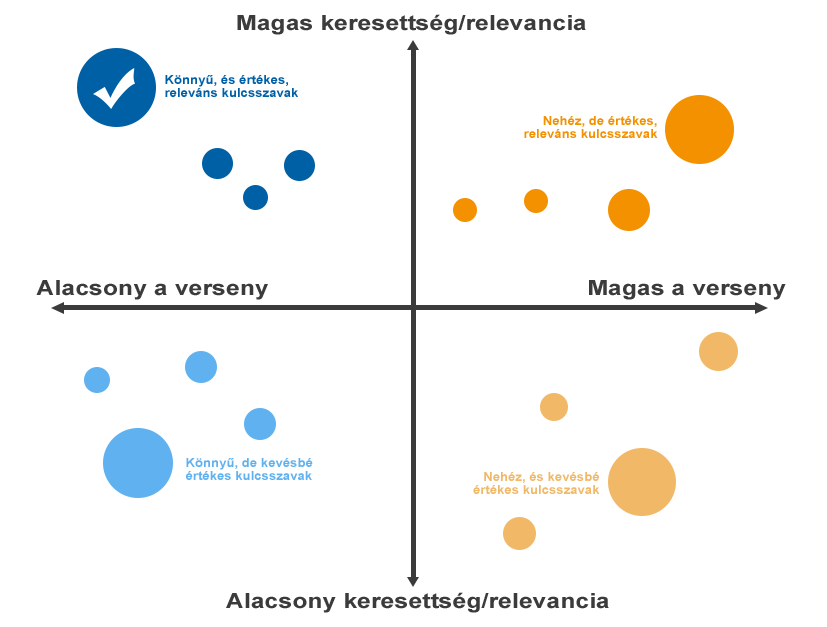
Why is a good Google ranking important?
- More visitors
- Relevant visitors
- More revenue / contact us / request a quote
- Users with more purchasing power
If we want to understand why it is important to rank well, and how each position differs from the other in terms of attracting actual visitors, we need to look at some statistics.
It is now a well-known fact that, outside the first page of the Google search results, the second page of the only less than 10% of users are reached.
But there are also big differences in the number of clicks between results on the first page.
There's a big difference if your hit is at the top of the page compared to if it's at the bottom of the page. This not only shows the disadvantage in scrolling, but also shows that the user browsing the results at the bottom of the page has already scrolled through quite a few results before us.
Our experience is that most people order from websites in the top 4-5 results. There is a certain psychological factor to this. In general, the so-called "good customers", who are easy decision makers, look at a maximum of 4-5 websites and make their decision easily and decisively. Users who have looked through more than 10 hits and still haven't found the product or service they need tend to have less buying power and may be more problematic to deal with.
To complicate matters further, the hit list is quite complex and complicated. It is not only the so-called natural results that are included, but also the organic ones.
Structure of the results list
At first glance, the results list seems rather complicated, as it is made up of several different sections. You can find ads, normal organic results, and in addition, there are sometimes map and video results.
Our positioning queries can be used to check the display of ads and to find out the positions of organic, also known as natural, results.
Organic results
Natural hits are calculated based on the quality of the web pages and the strength of the link networks, among other things. Of course, this makes the situation much more complicated, but that is not the subject of this article. We'll go into why we should know what position we are in for important keywords, and that's what the organic listing test is all about.
These results have a high level of user involvement in the confidence index, i.e. users have developed the image over the years that what Google shows as a natural result in a good position are the "good and reliable companies". So it makes sense for us to fall into this category.
Paid (Google Ads) results
Paid ads are listed in a section at the top of the results list. Actually, the position of these can also be queried by some software. This information is of interest to advertisers who want to appear in 100% of the cases, and in a good position compared to other ads.
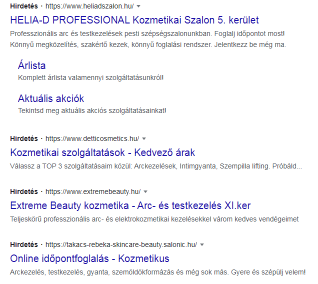
MAP - Map results
Map results are not always displayed in the search interface. It usually appears for keywords where the map contains relevant results. For example, if I'm looking for a particular service in a particular city, say a bakery, the system knows that I'm likely to get the most help from a map result. So it will display that.
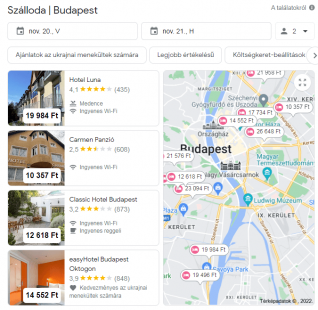
How does the actual position develop?
The system takes into account a number of other factors in addition to the content of the website and other search engine optimisation parameters when building the results list.
For example, the number of times we have searched for a particular topic and the websites we have visited so far in the process are relevant. The results list is always individualised. It even keeps track of whether you're logged into your Gmail account and what area you're in.
Position enquiry software
What are the expectations of a software that queries Google positions?
First of all, it is advisable to be able to query the position of Hungarian keywords properly, and the user interface should also be in Hungarian.
You may also want to be able to organise the keywords in lists and to specify one or more website addresses that you want to see the position of.
In fact, there are software that allow you to query not only the position of your own website, but also that of certain competitors.
The results should preferably be sent by email in a timed manner to the email addresses provided. In addition, it should also be possible to view these results in the system's administrator interface.
Good software can work with any number of keywords without being blocked by Google.
If we find software that meets the above criteria, all we need is that it offers these services at a reasonable price.
